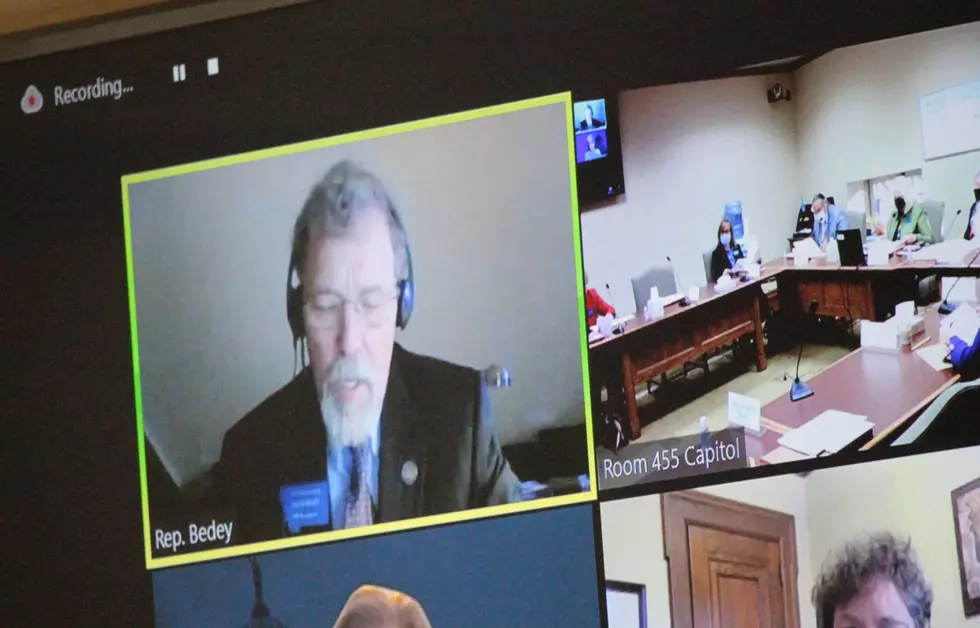
Bill would limit Montana governor’s emergency powers during extended crisis
A bill under consideration by the Montana Legislature would give legislators more opportunity to check emergency powers granted to the governor in long-running disaster situations like the ongoing COVID-19 pandemic.
The measure, House Bill 122, seeks to limit how long emergency and disaster declarations issued by the governor can remain in effect without legislative authorization, distinguish Montana emergency declarations from federal ones, and streamline the process of convening a special session so the Legislature can vote to overturn a governor’s decisions about emergency orders and aid allocations.
Sponsor Rep. David Bedey, R-Hamilton, told the House State Administration Committee in a hearing Tuesday that the bill is a direct response to the COVID-19 situation, which has had Montana operating under a state of emergency since last March. He and other lawmakers said they’ve gotten an earful from constituents who have wanted the Legislature, which is Republican-controlled, to play a bigger role in the state’s coronavirus response.
“Our system was built so there’s tension between the legislative branch and the executive branch in terms of their powers and prerogatives,” Bedey said. “It’s important for us to strike the right balance here.”
Four citizens testified in favor of the measure, saying they’ve been frustrated by anti-COVID public health directives issued by former Gov. Steve Bullock, a Democrat who left office at the beginning of the month.
“I am disgusted by the current dictates of the governor, the previous governor, severely impacting my community,” said Mark French, of Paradise.
“We have clearly seen what happens when the governor is made king for 10 months. And we don’t want to ever see that happen again,” said Cindy Hamilton, of Helena.
In an effort to slow the spread of the virus among Montana citizens, Bullock issued directives that, among other steps, shut down many businesses for several weeks last spring and mandated mask usage in most public settings starting last July. Those directives took their legal basis from Bullock’s emergency declaration, which he initiated March 12 and then updated March 13 to run concurrently with the national emergency declaration issued that same day by President Donald Trump.
Gov. Greg Gianforte, a Republican who was elected last fall and sworn in at the beginning of the month, said last week he will lift the state mask mandate once more Montanans are vaccinated and the Legislature passes a bill to shield businesses, churches and other entities from COVID-19-related liability lawsuits. The state remains under a Bullock directive from November that regulates restaurant and bar occupancy and limits public gatherings where it isn’t possible to social distance to 25 people or fewer.
As currently written, state law limits Montana-scope emergency declarations to 30 days, unless the U.S. president has issued a national emergency order or the state Legislature convenes to approve an extension. Trump’s national COVID-19 emergency declaration, which is still in effect, meant that Bullock didn’t have to seek the Legislature’s approval to maintain the coronavirus state of emergency beyond last April.
Bedey’s bill would revise state law to make the 30-day period for Montana emergency declarations a firm limit, as well as rework a separate disaster declaration statute to accommodate ongoing crises like the coronavirus pandemic. After a 30-day emergency period, the governor could enact a subsequent disaster declaration, but would be required to provide explanation to legislative leaders and get approval from the full Legislature to extend a disaster declaration beyond 60 days.
The bill would also make it faster for the Senate president, speaker of the house and other legislative leaders to poll the Legislature to see if lawmakers want to convene a special session where they could endorse the disaster declaration or vote to overturn the governor’s emergency orders. The Legislature would also have the explicit power to override the governor’s authority to decide how to spend emergency aid money like the $1.25 billion in coronavirus relief money allocated to Montana under the federal CARES Act.
Bedey, who is quarantining after announcing a positive COVID-19 test last week, introduced the bill via video call. While discussing the proposal, he called it a “mistake” for the legislative branch to have written current emergency laws that cede so much power to the governor’s executive branch of government.
“I think our citizens demand that we as a separate and equal branch of government exercise some authority during those times,” he said.
No one testified in opposition to the measure at Tuesday’s hearing, though Rep. Jessica Karjala, D-Billings, expressed some concern about the bill producing “unintended consequences.”
The next procedural step for the bill is a vote by the House State Administration Committee, which will decide whether to recommend it for debate on the House floor. In order to become law, bills must pass both the House and Senate and then head to the governor, who has the option of issuing a veto that can be overridden only by two-thirds majorities of representatives and senators.
This story originally appeared online at Montana Free Press and is republished here by permission.
